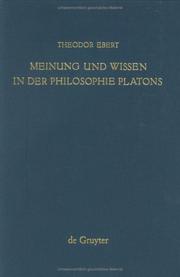| Listing 1 - 4 of 4 |
Sort by
|

ISBN: 311004787X 3110834820 9783110047875 Year: 1974 Publisher: Berlin de Gruyter
Abstract | Keywords | Export | Availability | Bookmark
 Loading...
Loading...Choose an application
- Reference Manager
- EndNote
- RefWorks (Direct export to RefWorks)
Meinung Und Wissen In Der Philosophie Platons: Untersuchungen Zum ""Charmides"", ""Menon"" Und ""Staat""
Plato. --- Theory of knowledge --- Plato --- Doxa. --- Platon / Literatur über die Werke. --- Wissen / Geschichte. --- Plato - Charmides --- Plato - Meno --- Plato - Republic
Book
ISBN: 9780521190404 9781107664616 0521190401 9780511993497 1107664616 1139124633 1107213649 113912305X 9786613316356 0511993498 1139127969 1139112945 1283316358 1139117300 1139115138 Year: 2011 Publisher: Cambridge Cambridge University Press
Abstract | Keywords | Export | Availability | Bookmark
 Loading...
Loading...Choose an application
- Reference Manager
- EndNote
- RefWorks (Direct export to RefWorks)
This book argues that Plato's Charmides presents a unitary but incomplete argument intended to lead its readers to substantive philosophical insights. Through careful, contextually sensitive analysis of Plato's arguments concerning the virtue of sophrosyne, Thomas M. Tuozzo brings the dialogue's lines of inquiry together, carrying Plato's argument forward to a substantive conclusion. This innovative reading of Charmides reverses misconceptions about the dialogue that stemmed from an impoverished conception of Socratic elenchus and unquestioned acceptance of ancient historiography's demonization of Critias. It views Socratic argument as a tool intended to move its addressee to substantive philosophical insights. It also argues, on the basis of recent historical research, a review of the fragments of Critias' oeuvre and Plato's use of Critias in other dialogues, that Plato had a nuanced, generally positive view of Critias. Throughout, readers are alerted to textual difficulties whose proper resolution is crucial to understanding Plato's often abstract arguments.
Morale --- Théorie de la connaissance --- Platon, --- Charmides (Plato) --- Ethics --- Knowledge, Theory of --- Plato --- Théorie de la connaissance --- Early works to 1800. --- Ouvrages avant 1800 --- Plato. --- Platon --- Arts and Humanities --- History

ISBN: 9060322746 9027272549 1283903245 9789060322741 9789027272546 9781283903240 Year: 1985 Publisher: Amsterdam B.R. Grüner Pub. Co.
Abstract | Keywords | Export | Availability | Bookmark
 Loading...
Loading...Choose an application
- Reference Manager
- EndNote
- RefWorks (Direct export to RefWorks)
The Charmides is among Plato's most intriguing and perplexing dialogues. The range of subjects touched or treated is extremely wide: matters logical, epistemological, moral, ethical, political, and religious. In many cases, these are discussed in a highly inconclusive and aporetic way, especially when it comes to the subject of knowledge. Finally, the dialogue is also difficult on almost every level of its expression; mock-reasonings, misunderstandings, ironies, paradoxes, and perplexities abound. As a result, the run of its many arguments, both on the short and the long range, and its overall
Ethics --- Knowledge, Theory of --- Early works to 1800 --- Plato --- 875 PLATO --- -Knowledge, Theory of --- -Epistemology --- Theory of knowledge --- Philosophy --- Psychology --- Deontology --- Ethics, Primitive --- Ethology --- Moral philosophy --- Morality --- Morals --- Philosophy, Moral --- Science, Moral --- Values --- 875 PLATO Griekse literatuur--PLATO --- Griekse literatuur--PLATO --- Aflāṭūn --- Aplaton --- Bolatu --- Platon, --- Platonas --- Platone --- Po-la-tʻu --- Pʻŭllatʻo --- Pʻŭllatʻon --- Pʻuratʻon --- Πλάτων --- אפלטון --- פלאטא --- פלאטאן --- פלאטו --- أفلاطون --- 柏拉圖 --- 플라톤 --- Plato. --- Greek literature. --- Balkan literature --- Byzantine literature --- Classical literature --- Classical philology --- Greek philology --- Platon --- Платон --- プラトン --- Criticism and interpretation. --- Ethics - Early works to 1800 --- Knowledge, Theory of - Early works to 1800 --- Plato - Charmides
Book
ISBN: 1282645048 9786612645044 1400835062 0691128561 0691163421 9780691163420 9781400835065 9781282645042 9780691128566 Year: 2010 Publisher: Princeton, NJ
Abstract | Keywords | Export | Availability | Bookmark
 Loading...
Loading...Choose an application
- Reference Manager
- EndNote
- RefWorks (Direct export to RefWorks)
In recent years, most political theorists have agreed that shame shouldn't play any role in democratic politics because it threatens the mutual respect necessary for participation and deliberation. But Christina Tarnopolsky argues that not every kind of shame hurts democracy. In fact, she makes a powerful case that there is a form of shame essential to any critical, moderate, and self-reflexive democratic practice. Through a careful study of Plato's Gorgias, Tarnopolsky shows that contemporary conceptions of shame are far too narrow. For Plato, three kinds of shame and shaming practices were possible in democracies, and only one of these is similar to the form condemned by contemporary thinkers. Following Plato, Tarnopolsky develops an account of a different kind of shame, which she calls "respectful shame." This practice involves the painful but beneficial shaming of one's fellow citizens as part of the ongoing process of collective deliberation. And, as Tarnopolsky argues, this type of shame is just as important to contemporary democracy as it was to its ancient form. Tarnopolsky also challenges the view that the Gorgias inaugurates the problematic oppositions between emotion and reason, and rhetoric and philosophy. Instead, she shows that, for Plato, rationality and emotion belong together, and she argues that political science and democratic theory are impoverished when they relegate the study of emotions such as shame to other disciplines.
Democracy - Philosophy. --- Democracy -- Philosophy. --- Plato. --- Plato. Gorgias. --- Shame - Political aspects. --- Shame -- Political aspects. --- Shame --- Democracy --- Philosophy --- Philosophy & Religion --- Political aspects --- Political aspects. --- Philosophy. --- Emotions --- Guilt --- Ad hominem. --- Allan Bloom. --- Ambiguity. --- Ambivalence. --- Anger. --- Aristotle. --- Athenian Democracy. --- Bernard Williams. --- Callicles. --- Catamite. --- Charmides (dialogue). --- Child abuse. --- Civility. --- Conflation. --- Controversy. --- Criticism. --- Critique. --- Crito. --- Deliberation. --- Demagogue. --- Dialectic. --- Dichotomy. --- Direction of fit. --- Disgust. --- Disposition. --- Distrust. --- Elitism. --- Embarrassment. --- False-consensus effect. --- Forensic rhetoric. --- Form of life (philosophy). --- Freedom of speech. --- Gorgias (dialogue). --- Gorgias. --- Grandiosity. --- Gregory Vlastos. --- Hannah Arendt. --- Hedonism. --- Hippias Major. --- Human Rights Watch. --- Humiliation. --- Ideology. --- Inference. --- Irony. --- Jon Elster. --- McGill University. --- Morality. --- Multitude. --- Myth. --- Nicomachean Ethics. --- Omnipotence. --- On the Soul. --- Ostracism. --- Pathos. --- Perversion. --- Phaedo. --- Phaedrus (dialogue). --- Phenomenon. --- Philosopher. --- Pity. --- Pleonexia. --- Political philosophy. --- Politics. --- Polus. --- Prejudice. --- Princeton University Press. --- Protagoras. --- Psychoanalysis. --- Psychotherapy. --- Public sphere. --- Pythagoreanism. --- Rationality. --- Reason. --- Reintegrative shaming. --- Republic (Plato). --- Result. --- Rhetoric. --- Self-criticism. --- Self-deception. --- Self-esteem. --- Self-image. --- Shame. --- Social stigma. --- Socratic (Community). --- Socratic method. --- Socratic. --- Sophism. --- Sophist. --- Suffering. --- Suggestion. --- Symposium (Plato). --- The Philosopher. --- Theory. --- Thought. --- Thrasymachus. --- Uncertainty. --- Vlastos. --- Vulnerability.
| Listing 1 - 4 of 4 |
Sort by
|

 Search
Search Feedback
Feedback About UniCat
About UniCat  Help
Help News
News